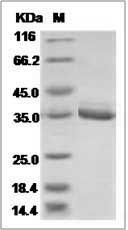-
Product Name
Human Fibrinogen gamma chain recombinant protein
- Documents
-
Description
Together with fibrinogen alpha (FGA) and fibrinogen beta (FGB), polymerizes to form an insoluble fibrin matrix. Has a major function in hemostasis as one of the primary components of blood clots. In addition, functions during the early stages of wound repair to stabilize the lesion and guide cell migration during re-epithelialization. Was originally thought to be essential for platelet aggregation, based on in vitro studies using anticoagulated blood. However, subsequent studies have shown that it is not absolutely required for thrombus formation in vivo. Enhances expression of SELP in activated platelets via an ITGB3-dependent pathway. Maternal fibrinogen is essential for successful pregnancy. Fibrin deposition is also associated with infection, where it protects against IFNG-mediated hemorrhage. May also facilitate the antibacterial immune response via both innate and T-cell mediated pathways. {UniProtKB:E9PV24}.
-
Protein name
Fibrinogen gamma chain
-
Uniprot ID
P02679
-
Gene Name
FGG; PRO2061
-
Source/Expression Host
Yeast
-
Expression Plasmid/cDNA
A DNA sequence encoding the human FGG (NP_068656.2) (Val169-Leu453) was expressed.
-
Protein Species
Human
-
Molecular weight
The recombinant human FGG consists of 285 amino acids and predicts a molecular mass of 32.2 kDa.
-
Purity
> 95 % as determined by SDS-PAGE.
-
Validations

Human FGG Protein
Related Products / Services
Please note: All products are "FOR RESEARCH USE ONLY AND ARE NOT INTENDED FOR DIAGNOSTIC OR THERAPEUTIC USE"
